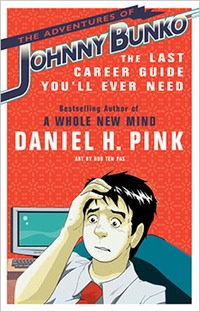I feel that one of the worst areas that schools cover is their career counselling options. This is how my room mate (name changed) at University described his career counselling session during his secondary school.
‘Mr. McIver, I see you have excellent grades in science – you should apply to medical school’,
‘Well actually I’d like to study engineering’,
‘Don’t be silly your grades are easily good enough to get into a good medical school.’
‘But I like engineering!’.
‘Son, I don’t think you’re hearing what I’m saying - it’s a certainty you’ll be accepted into a medical school!’
I believe at that point he excused himself, and went onto do electrical engineering and started his own engineering company, but there aren’t many that are as strong willed as he. As far as the careers advisor was concerned, the purpose of education is to get good enough grades to become a medic, or a lawyer, or even an accountant; I guess he thought if all else fails and at a last resort – one could become an engineer!
As for me, I can’t say that my grades were good enough to be presented with this dilemma - so I ended up as an academic, go figure!
Why do we as parents, or why did our parents have such tunnel vision as to what it means to have a successful career? I believe the answer has to do with the perceived status and potential salary that we can earn from the career. Let me ask the following hypothetical question, if you had a daughter who announced her engagement to her boyfriend whom you’ve only just met – would you be as happy if the boyfriend was a medical doctor, or a waste/garbage/rubbish collector with the City Council? There aren’t many who would initially really be just as happy if the son-in-law to be was the latter regardless of how nice the gentleman is, or how steady his job, or how well he bathes after work.
The unfortunate thing about this phenomena is that this plays to the perceptions of the society that we live in, regardless of the strengths and weaknesses of an individual. So I have another friend whose father owned a successful legal firm. My friend has a disposition (strength) that shows he is a gifted artist, a fabulous raconteur and someone who likes to partake in intellectual fencing about various philosophical positions. In short, he should have been an artist living in Paris as a bohemian frequenting cafés. Instead he has persuaded himself that he has been forced to become a lawyer at which he is ‘adequate’ but not nearly as gifted as he could or would be as an artist.
I’m sure that many of you reading this article can relate to this phenomena, either for yourselves or for someone whom you know, who was pressured into a job that they never really wanted to do.
The problem – as I see it – is that we equate money and status in society with ‘success’ and ‘happiness’ whereas the psychological research unequivocally shows us that after we reach a basic threshold (we can cover our basic needs) having more money, or a higher status does not actually make us even more happy.
What this tells us is that we need to educate our children to cover their basic needs which might include the following:
- to adequately clothe and feed themselves and their eventual family with good nutrition and clean water;
- to be able to provide adequate safe housing and shelter;
- to be able to pay for medical bills when required;
- to be able to give a small amount to help the perceived needy (sometimes directly, or sometimes via an organisation such as a charity or a church group).
This is the basic ‘survive’ foundation that will give our children their basic ‘happiness’. However, to make them ‘thrive’ they really need to work on becoming what psychologist Abram Maslow called self-actualisation. Hard to sum up in a few words or sentences but I think it is not a million miles away from feeling that one has a purpose in life, and that one is able to fulfil much of that purpose (or potential) and feel wanted or of value in the community in which one lives. Certainly one way to move towards such an ideal state of mind, is to feel content and satisfied with the work that one does. Essentially aim towards a career that employs a person’s strengths, which are often their passions in life.
Sadly, I don’t hold out much hope for careers advisors as they currently stand. Like early childhood teachers, the position is not one that is highly regarded and yet it is one of the most difficult jobs to do sensitively and more or less correctly. Normally it's the job given to the most junior member of teaching staff or the most recently employed at a school. No wonder it is the worst run job at the school.
However, for those that can order books online, or have friends order and send the book over, there is a very impressive paperback book written in a comic style (actually Japanese Manga) called “The Adventures of Johnny Bunko: The last career guide you’ll ever need”, by Dan Pink. This book succeeds where the actual school teachers appear to fail in that the lessons appear to steer people to careers that are fulfilling and worthwhile. If covering one’s basic fundamentals are the basic for ‘surviving’ then following the principles of being content and satisfied are the keys to ‘thriving’ and not ‘just surviving’.



